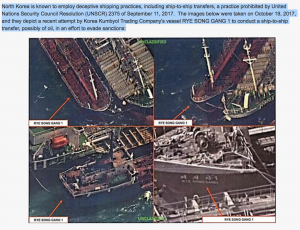By: Benjamin Katzeff Silberstein
Today, the Treasury Department’s Office of Foreign Asset Control (OFAC) announced new sanctions against a number of Chinese and North Korean entities. The sanctions “target third-country persons with long-standing commercial ties to North Korea, as well as the transportation networks that facilitate North Korea’s revenue generation and operations,” said a press statement.
Overall, these additional measures seem designed to clamp down on avenues for North Korea to circumvent current UN sanctions. Among those sanctioned are three Chinese companies that have traded with North Korea in goods that are covered by UN sanctions from this and last year:
OFAC designated Dandong Kehua Economy & Trade Co., Ltd., Dandong Xianghe Trading Co., Ltd., and Dandong Hongda Trade Co. Ltd. pursuant to E.O. 13810. Between January 1, 2013 and August 31, 2017, these three companies cumulatively exported approximately $650 million worth of goods to North Korea and cumulatively imported more than $100 million worth of goods from North Korea. These goods have included notebook computers, anthracite coal, iron, iron ore, lead ore, zinc ore, silver ore, lead, and ferrous products.
Also targeted are companies that have traded in goods that are either covered by sanctions, or (it seems) fall under the dual-use category of goods that can be used in nuclear weapons/missile development:
OFAC designated Sun Sidong and his company, Dandong Dongyuan Industrial Co., Ltd. (Dongyuan), pursuant to E.O. 13810. Sun and Dongyuan were responsible for exporting over $28 million worth of goods to North Korea over several years, including motor vehicles, electrical machinery, radio navigational items, aluminum, iron, pipes, and items associated with nuclear reactors. Dongyuan has also been associated with front companies for weapons of mass destruction-related North Korean organizations.
The sanctions also target vessels that are suspected of having transferred oil to North Korea via other ships (ship-to-ship transfer) in violation of sanctions (this part contains some pretty impressive pictures):
All in all, these new sanctions appear to try to fill the gaps left by current sanctions. Surely, they will cause added trouble for North Korea. But the problem, to begin with, is that North Korea has historically been good at adapting to new sanction’s frameworks and finding new methods to circumvent them. Only time will tell whether these skills of North Korea still hold up in the current sanctions environment.

